- Home
- George Orwell
Down and Out in Paris and London Page 2
Down and Out in Paris and London Read online
Page 2
To modern readers, one of the debates provoked by Down and Out-was it a slice of factual autobiography or part fiction?-may seem trivial. Yet Orwell took it seriously and in a somewhat muddled Introduction to the 1935 French edition (entitled La Vache enragee) he tried to be frank about his evolution as a documentary writer and about the tricks of that trade: 'I think I can say that I have exaggerated nothing except in so far as all writers exaggerate by selecting. I did not feel that I had to describe events in the exact order in which they happened, but everything I have described did take place at one time or another...' This contradicts what he was soon to write about Down and Out in The Road to Wigan Pier: 'Nearly all [sic] the incidents described there actually happened.' And he then went on to assert; 'All the characters... in both parts of the book are intended more as representative types than as individuals.' Yet Down and Out's colourful characters seem the very reverse of 'representative types'; they interest and entertain precisely because they are such skilfully depicted individuals. Although the then thwarted novelist in Orwell may have tempted him to accentuate the idiosyncrasies of Charlie or Henri or Boris, one never doubts that those men existed. However, the dilemma that prompted Orwell's self-contradictions is familiar to every writer of documentaries; one feels in honour bound to protect those who served as raw material, while avoiding any distortion of facts.
Only in Chapter XXIV is it clear that Orwell did distort facts by claiming that on his return from Paris he found himself down and out in London and had not 'the slightest notion of how to get a cheap bed'. This of course heightens the tension and may be seen as a harmless literary device, like the omission of Aunt Nellie from his Paris social scene. But the truth is that in Paris he had already written his first substantial published essay, 'The Spike', describing a night spent in a Notting Hill tramps' hostel. Before his departure from England he had voluntarily lived among tramps for some time because 'I knew nothing about working-class conditions. I had read the unemployment figures but I had no notion of what they implied...' Had Orwell recorded his adventures among the poor chronologically, Down and Out might have been a more coherent and shapely book-if rather less dramatic.
What Orwell has to say in Chapter XXII about 'fear of the mob' seems, at first glance, outdated. Post-war affluence has greatly reduced the size of 'the mob' and in Britain the Welfare State has, apparently, placated what remains of it. Physically it is much less gruelling to be down and out now than it was fifty years ago. But psychologically is 'the mob' any better off? Orwell's fellow-tramps existed within an isolated subculture and were only vaguely aware of how the more fortunate lived. Now television makes the unemployed tormentingly aware of the unattainable-by them-affluence that is within reach of the majority of their compatriots. So far Big Sister is winning and 'the mob' remains docile. But if Orwell were still around he might well feel uneasy about his country's future-less because of 'the mob's' potential for destruction than because of the techniques being devised to control it.
DERVLA MURPHY
A Note on the Text
Down and Out in Paris and London was first published by Gollancz on 9 January 1933 and by Harper & Brothers in New York on 30 June of that year. A French translation-of considerable importance in the establishment of the text of this edition-was made by R. N. Raimbault and Gwen Gilbert, entitled La Vache enragee, and published by Gallimard, 8 May 1935. Unmarked page proofs (the Proof) of the first London edition came to light some forty years later. They carry the date, 1932, on the title-page, the title is given as Confessions of a Down and Out in London and Paris, and the author simply as 'X'. Eric Blair's choice of the name 'George Orwell' stems from his letter of 19 November 1932 to his agent, Leonard Moore. This edition is based on the first London edition amended in the light of La Vache enragee, a translation which Orwell greatly admired, in contrast to that of Burmese Days, which he described as 'VERY BAD'. (There is a second translation into French, Dans la deche a Paris et a Londres, by Michel Petris, 1982, which sticks much more closely to the English-language edition.)
Victor Gollancz, who encouraged Orwell as a writer and published his first books, was very cautious of running up against the law, a danger even more prevalent for publishers at that time than it is today. It was not so very long before the publication of Down and Out in Paris and London that Henry Vizetelly had been jailed for publishing the novels of Emile Zola, an experience that ruined his health. On 1 July 1932 Orwell told his agent what Gollancz required:
Names are to be changed, swearwords etc. cut out, and there is one passage which is to be either changed or cut out. It's a pity, as it is about the only good bit of writing in the book, but he says the circulation libraries would not stand for it.
That 'good bit of writing' (Charlie's story, chapter II) was not, in the event, lost, though it was evidently modified. On 6 July 1932 Orwell told Leonard Moore, 'I have crossed out or altered the phrases that seemed to show too definitely what was happening & perhaps like this it might pass inspection.' Evidently it did, though no details have survived. (Leonard Moore's last surviving letter to Orwell, written a couple of month's before Orwell's death, requested the cutting of 140 lines from the Spanish translation of Nineteen Eighty-Four which, it was feared, would strike the Argentinian authorities as immoral.) The Proof shows that there was a further glossing-over of swearwords and a couple of interesting passages of rewriting. On page 68, line 11, 'he farted loudly, a favourite Italian insult' was changed to 'delivered a final insult in the same manner as Squire Western in Tom Jones'. On page 82, lines 23-4, 'Hotel----, after some famous prostitute who was born in the quarter, I expect' had to be changed to 'Hotel Suzanne May, after some famous prostitute of the time of the Empire'. The Proof also shows that Orwell added three more footnotes.
The publishers of La Vache enragee (the title is idiomatic French for being destitute and was used for a short-lived humorous journal published in Paris in 1896) were less inhibited than Gollancz was forced to be. The English edition, the translators explained, had had to resort to dashes for many swearwords (some quite mild) but they had restored these words in full in the light of the author's indications. Orwell's French was good, but where he used French in his English text the translators sometimes made this more colloquial. In addition, Orwell added explanatory footnotes for the French readers, evidently in answer to questions posed by the translators, and they themselves added footnotes (explaining, for example, the meanings of public houses and public schools and that traffic in England drove on the left and not, as in France, on the right).
This variety of material enables something of the original tone of Orwell's book to be recovered, but it is not always possible to make clear-cut decisions as to what to include and what to leave out. It is not always plain which are Orwell's additional footnotes to the French translation (moreover, for this edition, they have to be translated back into English),1 and the filling in of blanks presents a number of problems. Thus, on page 143, line 23, the English edition has a dash, the French has 'sacrees', but the Proof has 'f----'. The French here, and elsewhere, is not an equivalent of what is suggested by the Proof-e.g., page 146, line 29, where the Proof again has 'f----', while the French has 'sale' ('filthy'). Blanks in the English text may be replaced in French by obscenities, remarkably mild expressions, or by nothing at all. Among words introduced into the French text are: sale, dingo, chier, foutre, sacre cochon, couillons-la, sacr..., salauds-la, vache.
This edition is circumspect in completing blanks, not out of prurience, but on grounds of textual uncertainty; only those footnotes are added which can reasonably be assigned to Orwell; and the more colloquial French of La Vache enragee has been adopted in the light of Orwell's approval of the French translation and bearing in mind his wish that Spanish names in Homage to Catalonia should be regularised in any later editions. A full explanation of what has been done will be found in the Textual Note to the Complete Works edition, I, pages 217-30 (Secker and Warburg, 1986). That edition also gives footn
otes found in the French edition that are not included here.
PETER DAVISON
Albany, London
I
THE RUE DU COQ D'OR, Paris, seven in the morning. A succession of furious, choking yells from the street. Madame Monce, who kept the little hotel opposite mine, had come out onto the pavement to address a lodger on the third floor. Her bare feet were stuck into sabots and her grey hair was streaming down.
Madame Monce: 'Sacree salope! How many times have I told you not to squash bugs on the wallpaper? Do you think you've bought the hotel, eh? Why can't you throw them out of the window like everyone else? Espece de trainee!'
The woman on the third floor: 'Va donc, eh! vieille vache!'
Thereupon a whole variegated chorus of yells, as windows were flung open on every side and half the street joined in the quarrel. They shut up abruptly ten minutes later, when a squadron of cavalry rode past and people stopped shouting to look at them.
I sketch this scene, just to convey something of the spirit of the Rue du Coq d'Or. Not that quarrels were the only thing that happened there-but still, we seldom got through the morning without at least one outburst of this description. Quarrels, and the desolate cries of street hawkers, and the shouts of children chasing orange-peel over the cobbles, and at night loud singing and the sour reek of the refuse-carts, made up the atmosphere of the street.
It was a very narrow street-a ravine of tall leprous houses, lurching towards one another in queer attitudes, as though they had all been frozen in the act of collapse. All the houses were hotels and packed to the tiles with lodgers, mostly Poles, Arabs and Italians. At the foot of the hotels were tiny bistros, where you could be drunk for the equivalent of a shilling. On Saturday nights about a third of the male population of the quarter was drunk. There was fighting over women, and the Arab navvies who lived in the cheapest hotels used to conduct mysterious feuds, and fight them out with chairs and occasionally revolvers. At night the policemen would only come through the street two together. It was a fairly rackety place. And yet amid the noise and dirt lived the usual respectable French shopkeepers, bakers and laundresses and the like, keeping themselves to themselves and quietly piling up small fortunes. It was quite a representative Paris slum.
My hotel was called the Hotel des Trois Moineaux. It was a dark, rickety warren of five storeys, cut up by wooden partitions into forty rooms. The rooms were small and inveterately dirty, for there was no maid, and Madame F., the patronne, had no time to do any sweeping. The walls were as thin as matchwood, and to hide the cracks they had been covered with layer after layer of pink paper, which had come loose and housed innumerable bugs. Near the ceiling long lines of bugs marched all day like columns of soldiers, and at night came down ravenously hungry, so that one had to get up every few hours and kill them in hecatombs. Sometimes when the bugs got too bad one used to burn sulphur and drive them into the next room; whereupon the lodger next door would retort by having his room sulphured, and drive the bugs back. It was a dirty place, but homelike, for Madame F. and her husband were good sorts. The rent of the rooms varied between thirty and fifty francs a week.
The lodgers were a floating population, largely foreigners, who used to turn up without luggage, stay a week and then disappear again. They were of every trade -cobblers, bricklayers, stonemasons, navvies, students, prostitutes, rag-pickers. Some of them were fantastically poor. In one of the attics there was a Bulgarian student who made fancy shoes for the American market. From six to twelve he sat on his bed, making a dozen pairs of shoes and earning thirty-five francs; the rest of the day he attended lectures at the Sorbonne. He was studying for the Church, and books of theology lay face-down on his leather-strewn floor. In another room lived a Russian woman and her son, who called himself an artist. The mother worked sixteen hours a day, darning socks at twenty-five centimes a sock, while the son, decently dressed, loafed in the Montparnasse cafes. One room was let to two different lodgers, one a day worker and the other a night worker. In another room a widower shared the same bed with his two grown-up daughters, both consumptive.
There were eccentric characters in the hotel. The Paris slums are a gathering-place for eccentric people-people who have fallen into solitary, half-mad grooves of life and given up trying to be normal or decent. Poverty frees them from ordinary standards of behaviour, just as money frees people from work. Some of the lodgers in our hotel lived lives that were curious beyond words.
There were the Rougiers, for instance, an old ragged, dwarfish couple who plied an extraordinary trade. They used to sell postcards on the Boulevard St Michel. The curious thing was that the postcards were sold in sealed packets as pornographic ones, but were actually photographs of chateaux on the Loire; the buyers did not discover this till too late, and of course never complained. The Rougiers earned about a hundred francs a week, and by strict economy managed to be always half starved and half drunk. The filth of their room was such that one could smell it on the floor below. According to Madame F., neither of the Rougiers had taken off their clothes for four years.
Or there was Henri, who worked in the sewers. He was a tall, melancholy man with curly hair, rather romantic-looking in his long sewer-man's boots. Henri's peculiarity was that he did not speak, except for the purposes of work, literally for days together. Only a year before he had been a chauffeur in good employ and saving money. One day he fell in love, and when the girl refused him he lost his temper and kicked her. On being kicked the girl fell desperately in love with Henri, and for a fortnight they lived together and spent a thousand francs of Henri's money. Then the girl was unfaithful; Henri planted a knife in her upper arm and was sent to prison for six months. As soon as she had been stabbed the girl fell more in love with Henri than ever, and the two made up their quarrel and agreed that when Henri came out of jail he should buy a taxi and they would marry and settle down. But a fortnight later the girl was unfaithful again, and when Henri came out she was with child. Henri did not stab her again. He drew out all his savings and went on a drinking-bout that ended in another month's imprisonment; after that he went to work in the sewers. Nothing would induce Henri to talk. If you asked him why he worked in the sewers he never answered, but simply crossed his wrists to signify handcuffs, and jerked his head southward, towards the prison. Bad luck seemed to have turned him half-witted in a single day.
Or there was R., an Englishman, who lived six months of the year in Putney with his parents and six months in France. During his time in France he drank four litres of wine a day, and six litres on Saturdays; he had once travelled as far as the Azores, because the wine there is cheaper than anywhere in Europe. He was a gentle, domesticated creature, never rowdy or quarrelsome, and never sober. He would lie in bed till midday, and from then till midnight he was in his corner of the bistro, quietly and methodically soaking. While he soaked he talked, in a refined, womanish voice, about antique furniture. Except myself, R. was the only Englishman in the quarter.
There were plenty of other people who lived lives just as eccentric as these: Monsieur Jules, the Roumanian, who had a glass eye and would not admit it, Fureux the Limousin stonemason, Roucolle the miser-he died before my time, though-old Laurent the rag-merchant, who used to copy his signature from a slip of paper he carried in his pocket. It would be fun to write some of their biographies, if one had time. I am trying to describe the people in our quarter, not for the mere curiosity, but because they are all part of the story. Poverty is what I am writing about, and I had my first contact with poverty in this slum. The slum, with its dirt and its queer lives, was first an object-lesson in poverty, and then the background of my own experiences. It is for that reason that I try to give some idea of what life was like there.
II
LIFE IN THE QUARTER. Our bistro, for instance, at the foot of the Hotel des Trois Moineaux. A tiny brick-floored room, half underground, with wine-sodden tables, and a photograph of a funeral inscribed 'Credit est mort'; and red-sashed workmen carving sausage with b
ig jack-knives; and Madame F., a splendid Auvergnat peasant woman with the face of a strong-minded cow, drinking Malaga all day 'for her stomach'; and games of dice for aperitifs; and songs about 'Les Fraises et Les Framboises', and about Madelon, who said, 'Comment epouser un soldat, moi qui aime tout le regiment?'; and extraordinarily public love-making. Half the hotel used to meet in the bistro in the evenings. I wish one could find a pub in London a quarter as cheery.
One heard queer conversations in the bistro. As a sample I give you Charlie, one of the local curiosities, talking.
Charlie was a youth of family and education who had run away from home and lived on occasional remittances. Picture him very pink and young, with the fresh cheeks and soft brown hair of a nice little boy, and lips excessively red and wet, like cherries. His feet are tiny, his arms abnormally short, his hands dimpled like a baby's. He has a way of dancing and capering while he talks, as though he were too happy and too full of life to keep still for an instant. It is three in the afternoon, and there is no one in the bistro except Madame F. and one or two men who are out of work; but it is all the same to Charlie whom he talks to, so long as he can talk about himself. He declaims like an orator on a barricade, rolling the words on his tongue and gesticulating with his short arms. His small, rather piggy eyes glitter with enthusiasm. He is, somehow, profoundly disgusting to see.

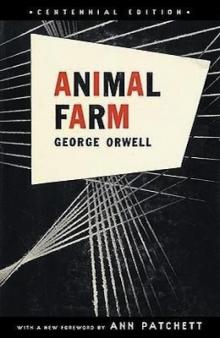 Animal Farm & 1984
Animal Farm & 1984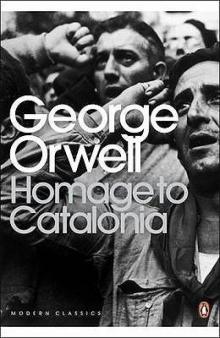 Homage to Catalonia
Homage to Catalonia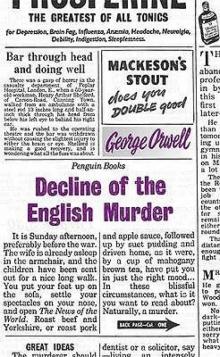 Decline of the English Murder
Decline of the English Murder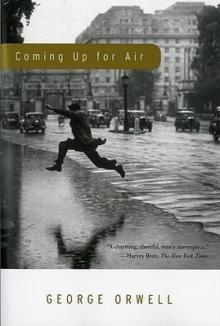 Coming Up for Air
Coming Up for Air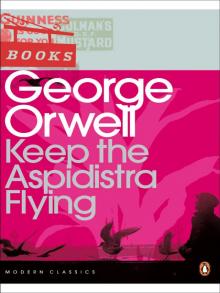 Keep the Aspidistra Flying
Keep the Aspidistra Flying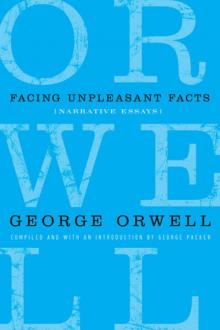 Facing Unpleasant Facts: Narrative Essays
Facing Unpleasant Facts: Narrative Essays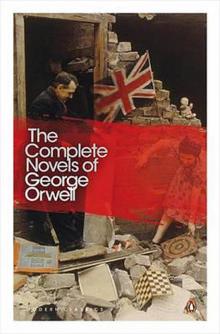 The Complete Novels of George Orwell
The Complete Novels of George Orwell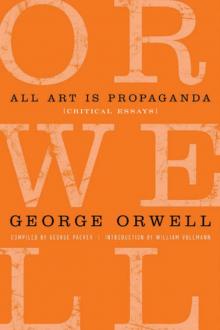 All Art Is Propaganda: Critical Essays
All Art Is Propaganda: Critical Essays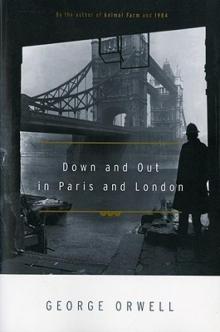 Down and Out in Paris and London
Down and Out in Paris and London Why I Write
Why I Write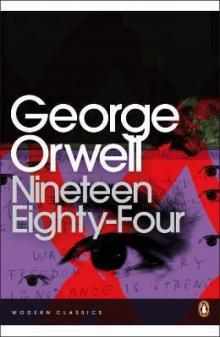 Nineteen Eighty-Four
Nineteen Eighty-Four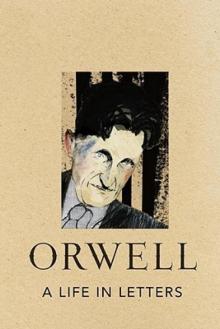 A Life in Letters
A Life in Letters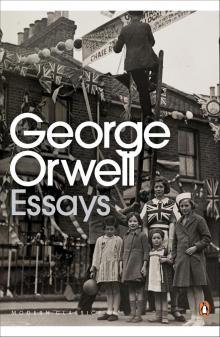 Essays
Essays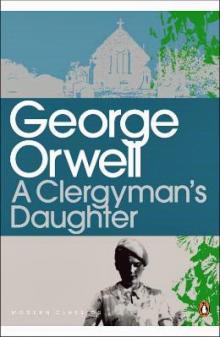 A Clergyman's Daughter
A Clergyman's Daughter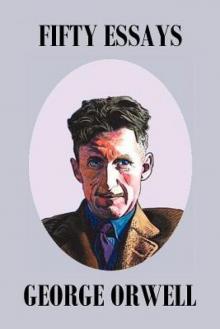 Fifty Orwell Essays
Fifty Orwell Essays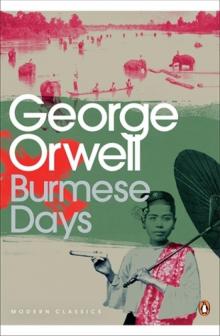 Burmese Days
Burmese Days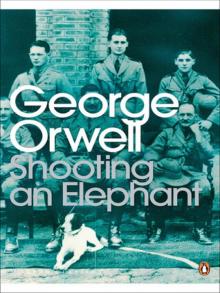 Shooting an Elephant
Shooting an Elephant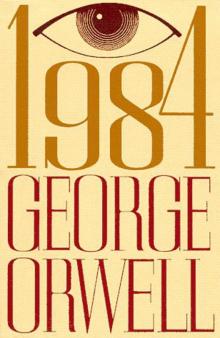 1984 (Penguin)
1984 (Penguin)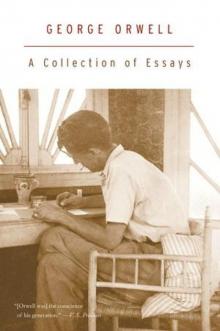 A Collection of Essays
A Collection of Essays 1984
1984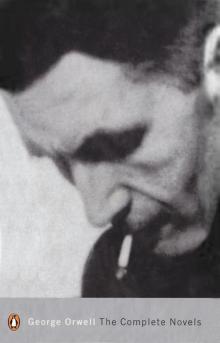 The Complete Novels
The Complete Novels All Art Is Propaganda
All Art Is Propaganda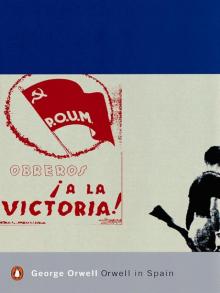 Orwell in Spain
Orwell in Spain Animal Farm: A Fairy Story
Animal Farm: A Fairy Story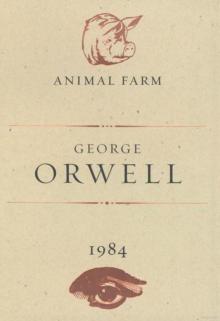 Animal Farm and 1984
Animal Farm and 1984